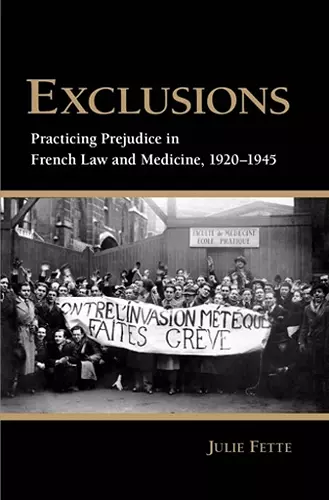Exclusions
Practicing Prejudice in French Law and Medicine, 1920–1945
Format:Hardback
Publisher:Cornell University Press
Published:15th Apr '12
Currently unavailable, and unfortunately no date known when it will be back

In the 1930s, the French Third Republic banned naturalized citizens from careers in law and medicine for up to ten years after they had obtained French nationality. In 1940, the Vichy regime permanently expelled all lawyers and doctors born of foreign fathers and imposed a 2 percent quota on Jews in both professions. On the basis of extensive archival research, Julie Fette shows in Exclusions that doctors and lawyers themselves, despite their claims to embody republican virtues, persuaded the French state to enact this exclusionary legislation. At the crossroads of knowledge and power, lawyers and doctors had long been dominant forces in French society: they ran hospitals and courts, doubled as university professors, held posts in parliament and government, and administered justice and public health for the nation. Their social and political influence was crucial in spreading xenophobic attitudes and rendering them more socially acceptable in France.
Fette traces the origins of this professional protectionism to the late nineteenth century, when the democratization of higher education sparked efforts by doctors and lawyers to close ranks against women and the lower classes in addition to foreigners. The legislatively imposed delays on the right to practice law and medicine remained in force until the 1970s, and only in 1997 did French lawyers and doctors formally recognize their complicity in the anti-Semitic policies of the Vichy regime. Fette's book is a powerful contribution to the argument that French public opinion favored exclusionary measures in the last years of the Third Republic and during the Holocaust.
Although other scholars have considered aspects of her subject, this book stands out by systematically comparing the development of exclusion in two French professions, and it provides new information on how the process worked in practice. Fette analyzes the role of students, professionals, and governments and the motives behind exclusion, including not just the prejudices invoked in the book's subtitle, but also economic protectionism and 'professional identity formation'....All in all, Fette’s sobering account makes a valuable contribution to the history of the professions.
-- Matthew Ramsey * Journal of the History of Medicine *"Her study is extremely detailedoften technicaland has the advantage of underlining the differences from one region to another.... In sumthis is an excellent essay in social history that expands our knowledge of the years of the occupation as well as of those that preceded it." —Renée PoznanskiBen Gurion
* Contemporary French Civilization *Julie Fette argues in this de?nitive work that medical and legal professionals helped prepare the ground for the Holocaust through generations of systematic efforts to limit professional competition by progressively narrowing the de?nition of eligibility to practice. Efforts to protect professional monopolies are as old as the professions themselves, but a con?uence of time and circumstance made then deadly in Europe in the years leading up to World War II.
-- Robert Nye * Journal of Modern History *This book contains the first comparative analysis of the laws initiated fromthe professions themselves. This was necessary to understand that what happened during the Vichy regime was a mere continuation of this processgiving much satisfaction to the professions that had so firmly advocated for what could be seen as anticipatory policies. Even the anti-Semitic legislation, that did not exist as such before the occupation, was rendered acceptable by the fact that xenophobia was long tainted by prejudice against Jews, notably from Eastern Europe... if lawyers and doctors applied those exclusion laws, in the wake of a more general policy in favor of their corporatist organizations, Fette's careful attention to the details of this implementation stresses the limits to their independence that those groups accepted in applying exclusion laws, particularly when it came to the control of their membership, causing the ruin, despair, and, indirectly, the death of colleagues. It is all the more striking that this legislation—and the myth of overcrowding justifying it—had not been totally erased by the new era opened by the liberation of the country.
-- Liora Israël, École des Hautes Études en Sciences Sociales * Law and History ReviISBN: 9780801450211
Dimensions: 235mm x 155mm x 25mm
Weight: 907g
328 pages